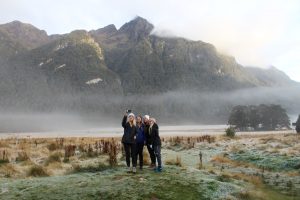For my STEP stipend I decided to partake in the education abroad program entitled Sustaining Enviornments and Human Societies that took place in New Zealand. For 24 days 15 other students, 4 adults, and myself traveled the majority of the South Island learning about the endemic wildlife, ecotourism, agriculture, the Maori culture, and sustainability. Below is my reflection on the amazing experience that took place in New Zealand!
Through this study abroad trip to New Zealand, my assumptions of how the world views Americans has been significantly changed in addition to broadening my definition of sustainability.
I always knew that America was a huge force in the world, but I didn’t understand the extent of that statement. Through interacting with the locals, I learned that they knew more about American politics than the majority of the people I traveled with. They asked me highly detailed questions about some of Trumps new policies, and it was interesting to hear their point of view. They believed that our news is skewed due to the fact that our media is either very conservative or very liberal. They’re able to read about events through unbiased, international news stations. By them being farther removed from the events they believed that they were able to provide insight into these events because they didn’t have the same emotional connection that many Americans had.
By interacting with the native Kiwi’s, I was not only able to learn their view of America and it’s politics, but also was able to learn about how they viewed sustainability. For many people in the US, they relate sustainability with renewable energy. However, more than 75% of New Zealand’s energy comes from hydroelectric power. By interacting with the kiwis and learning how they incorporate sustainability measures so easily into their housing and development, tourism, and land preservation was very inspiring.
I’ve always believed that sharing ideas is important, but traveling to New Zealand took this idea to the next level. Before traveling abroad, I spent time researching sustainability and the New Zealand culture as a part of our pre-departure curriculum. However, reading it online and experiencing it firsthand are two completely different things. Seeing the ideas put into actions made them seem more achievable in addition to providing hope.
An example of this was apparent in their agriculture. I’m a big supporter of grass fed cows, due to the harm that corn and grain feed can cause on these animals. The majority of beef in the United States comes from corn feed cows, which cause pain, infection, and disease to the cows considering their bodies were not designed to process corn. The fact that they are able to take care of their animals, and not shove them into CAFO’s (there’s only one in the entire country) gives me hope that the US could follow suit. Not only do CAFO’s hurt the cows, but they also have a negative impact on the environment due to the high levels of antibiotics they use that leach into their environment. In addition to this, cows produce high levels of CO2. The fact that New Zealand is conscious of their dairy production and how that impacts their natural environment gives me ideas on how I can make changes in my future profession.
As an inspiring social worker, I’m hoping to create lasting change in my community. During the past two years as I’ve interacted with social workers in the field, I’ve heard a lot of stories of success and failure. One common theme that I’ve been hearing is that it can be hard to take a theory and translate it into reality. What this experience has taught me is that it’s important to see what is already being done in communities both locally and globally. Strategies that work in some communities, could work or inspire new ideas in other communities.

Katie Andraschko

Thank you for sharing. It appears as though you were very much able to make personal meaning of this education abroad experience.